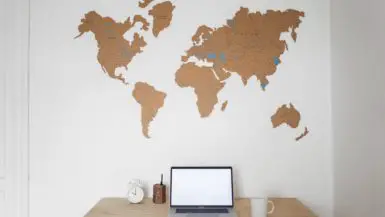Humans are, by their very nature, nomadic creatures. We’ve always been on the move. Even after settling down and forming towns and villages, there were many people who continued to move. Even after forming countries, people weren’t happy and we left for the New World. There was a time when being a drifter was a viable way of living; travelling from place to place working odd jobs for food and board. In our digital world, the way of the drifter lives on through the form of digital nomads.
What is a Digital Nomad?
Digital nomads are the latest evolution of remote workers. They generally travel around from place to place, doing their work from coffee shops, libraries, and co-working spaces – among other places. They can work anywhere with a wireless internet connection and a device such as a computer or mobile phone. That’s all they need to get the job done.

These are basically people who aren’t happy with having to settle down. They don’t like the idea of being stuck in one place. The problem is that not everyone has the luxury to move from place to place and just find any job that they can. You only have to try looking for a job to understand how untenable that lifestyle is in our modern day and age. It takes weeks and months (sometimes years) to land a “real” job; not hours and days. It would be great if you could walk into a store and walk out with a job, but that’s just how the world works anymore.
The internet provided the solution. Many jobs these days are becoming more internet-friendly. Things like graphic design and software development are things that can easily be done remotely. If you are already doing most of your work on a computer anyway, then why not take it to the next level? Why not become independent and do everything through your devices? You might not even have to leave your current job. Just ask your employer if you can start working remotely.
We live in a fairly globalized world. Social media has brought us all together and helped people to realise that they are living in a world filled with lots of different people and cultures. We know more about our fellow man than ever before. Globalization has made the idea of traveling and seeing the world in person more appealing. It’s also made it easier. Work visas are easier to obtain as countries reduce strict immigration laws. Just look at the EU; if you live in one member state you can live and work in any other with minimal effort.
Speaking of the EU, they’ve made becoming a digital nomad even easier with the advent of “e-Residency”. It basically allows digital entrepreneurs to begin an EU-based company and manage said company online. Estonia is the first country in the world to offer e-Residency to people. This is a government-issued digital identity and legal status that provides people with access to the Estonian digital business environment; one of the best – and most transparent – in the world. Establish a business in a country you don’t even live in and manage it online – that’s the dream of the digital nomad and countries like Estonia are making it a reality.
The process is really easy. All you need to do is put together all the right documents, send them off, and wait for the answer. Estonian border patrol will do a background check on you and will send you an email within 6-8 weeks to let you know if you qualify. If you do, you’ll be invited to collect your e-residency kit and gain access to a global community of fellow e-residents.
The idea of becoming a digital nomad isn’t just for young people either. Many semi-retired professionals are becoming digital nomads. Given that you can work where you want when you want (for the most part) it’s easier on their schedules and their health. Even some people who swore off work entirely have found themselves adopting the lifestyle. So don’t think that you’re too old to get started.
Entrepreneurs are prime candidates to become digital nomads. Many entrepreneurs already have digital pursuits of some kind. They run online businesses and sell digital goods. They rely on the internet for their way of life. The digital nomad lifestyle would give them the power to take greater advantage of online resources to live a more enjoyable life. It also helps with business success. Opening yourself up to the global market gives you more chances to make money and access to better talent.
Further Reading: a guide on how to become a digital nomad.
How do Digital Nomads Make Money?

Now you know more about digital nomads, you might be wondering how they actually make money. In general, digital nomads make money by;
- Working as Freelancers
Freelancers work through a project basis and generally have several clients they do work for. They are paid either hourly or a fixed amount based on the project in question and the wishes of the freelancer and their client. Writing, translation, design, software development, and digital marketing are the main choices for online freelancers.
- Doing Remote Jobs
If you can do your job without being physically in the office then you could request the chance to be a remote worker. If your boss agrees, you can work at home and do your current job as normal. More and more businesses are opening up to the idea of allowing remote workers.
- Becoming Self-Employed
Plenty of digital nomads go the route of becoming self-employed entrepreneurs. Whether they work alone or as part of a team is up to them. Like freelancers, they work in designing, marketing, content, consulting, and development. They also run e-commerce businesses or do drop-shipping. Others go even further out of the box, becoming business and life coaches or personal trainers.
Read More: Best jobs for digital nomads!5 Tips for Being a Digital Nomad
- Budgets are your Friend
Digital nomads need to regard their budgets as their bible. The better you stick to it, the more comfortable your life will be. You need to calculate living expenses, the costs of traveling and accommodation, activities you plan on doing, the costs of working, and how all of this would affect your savings if you find yourself out of work.
- Hope for the Best but Prepare for the Worst
Living abroad means having a lot of backup plans ready to go in case of emergency. Things rarely ever work perfectly. What would you do if you got stuck in a foreign country or your vehicle broke down? What’s your Plan B? What’s your Plan C? You have to get these plans in place before you need them.
- Join Your Fellow Nomads
There are lots of digital nomad communities out there you can join. These communities make it easier to adopt the lifestyle and deal with the difficulty curve. Your fellow nomads will be more than happy to answer any questions you have about the process and even where you are (or want to go to). They can also teach you more about working effectively when traveling. One of the main benefits of joining a community is networking with other traveling professionals and forming friendships that can lead to partnerships and other business opportuntiies.
- Have an Internet Connection
If an employer will do you the courtesy of letting you work remotely, the least you could do is be available for them. Not having a network connection is not an excuse to missing a deadline or not making a meeting. This also applies to client work that freelancers do. Make yourself available for clients.
You can consider buying a cell phone booster or a mobile hotspot device to stay connected to the internet. These boosters find even a tiny shred of reception and send it to you. Mobile hotspot devices strengthen mobile hotspot signals, so you can kiss goodbye to spotty public Wi-Fi connections.
- Speak the Language
It’s vital that you know some of the language for the country you want to travel to, or live in. Assuming that someone there will know English is one of the most dangerous things you can do. If you do find yourself in a situation where you don’t know the local language and the locals don’t know yours, then translation apps such as Google Translate are your friend.
One Last Thing
If you like the sound of living this adventurous lifestyle, then you should consider being a digital nomad. It’s a real challenge – likely the biggest you’ll ever face – but with some organization and discipline you can get it done.







Leave a reply